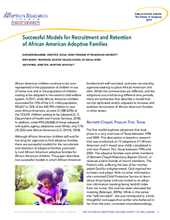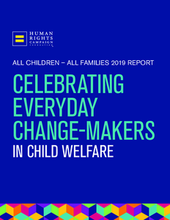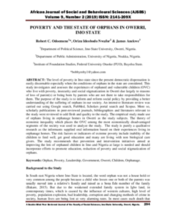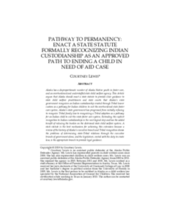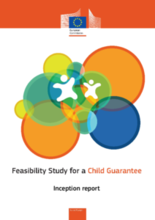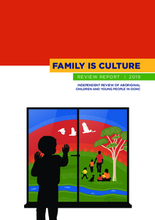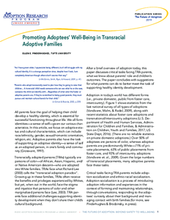Displaying 201 - 210 of 498
The current study explores how historical trauma has impacted American Indian tribes' trust in today's US public child welfare agencies.
This paper describes two successful models in which African American families both self-recruited, and were recruited by agencies seeking to place African American children.
This report highlights more than 70 child welfare agencies across the United States that partnered with the Human Rights Campaign Foundation’s All Children - All Families project to improve the services they provide to the LGBTQ community, including children in foster care and prospective foster and adoptive parents.
This study investigates and assesses the experiences of orphaned and vulnerable children (OVC) who live with poverty, insecurity and social stigmatization in Owerri due largely to reasons of loss of parent(s) or being born by parents who are not there to take responsibilities for them. The purpose of the study is to inform and reform social policy by providing a better understanding of the suffering of orphans in our society.
This article argues that the US state of Alaska should enact a state statute to provide clear guidance to state child welfare practitioners and state courts that Alaska’s state government recognizes an Indian custodianship created through Tribal law or custom as a pathway for Indian children to exit the overburdened state foster care system.
This report, which is also the fifth in the series, reflects on how children and the realisation of their rights continue to challenge our conscience even today.
This report - prepared for the European Commission by Applica and the Luxembourg Institute of Socio-Economic Research (LISER), in close collaboration with Eurochild and Save the Children - provides a first mapping of the situation across the 28 Member States of the EU outlining the situation in relation to children, particularly the four target groups (TGs) of disadvantaged children (children in institutions, children with disabilities, children of recent migrants and refugees, and children living in precarious family situations) as well as an indication of the key issues in relation to children’s access to the five policy areas (PAs): housing, healthcare, nutrition, early childhood education and care, and education.
This Review is aimed at examining the high rates of Aboriginal children and young people in out-of-home care (OOHC) in New South Wales (NSW), Australia and the implementation of the Aboriginal Child Placement Principle (ACPP) in this jurisdiction.
The purpose of this article is to examine the current well-being of the population of Bulgaria and to put emphasis on negative trends, including the abandonment of children due to poverty or other causes.
This paper discusses critical tasks facing adoptive parents of transracially adopted persons (TRAs), what we know about parents’ role and children’s outcomes.

